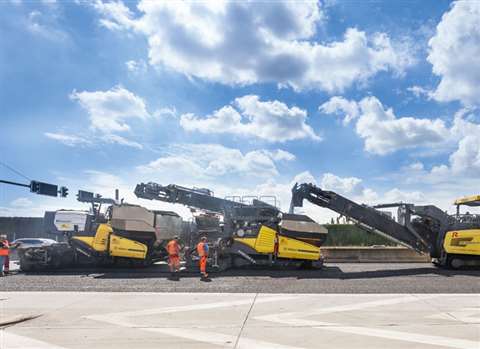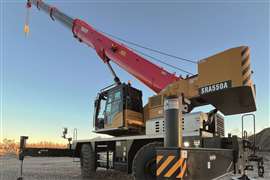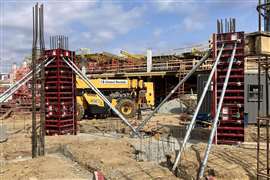Roadbuilding: Changing the rules
11 January 2017

New EU rules on public procurement and concessions have been introduced this year, and this is inevitably going to have an effect on the roadbuilding industry in Europe.
Under the new Directives, the award of contracts should be on the basis of the most economically advantageous tender – or MEAT, as it is often known – and lay down criteria for life-cycle costing.
While EUPAVE (the European Concrete Paving Association) said it welcomed the application of the new Directives, it said it looked forward to their full transposition in the EU Member States.
“This is essential,” it said, “so that the full benefit of the Directives can be exploited to promote the procurement of sustainable transport infrastructure. EUPAVE welcomes the move towards the Most Economically Advantageous Tender as the sole criterion to award public contracts.”
It added that public procurement was of great economic importance, accounting for around 18% of EU GDP (gross domestic product).
“The new rules will impact the way more than 250,000 public authorities in the EU countries spend a large part of the €1.9 trillion spent on public procurement every year in Europe.
“The EU Directives establish rules on the procedures for procurement by contracting authorities with respect to public contracts as well as design contests, whose value is estimated to be not less than certain thresholds.”
It said this was €5.186 million in the case of public works contracts.
EUPAVE said it believed that the new EU Directives offered a good opportunity to use a holistic approach when planning and building infrastructure for a sustainable transport system in the European Union.
“However, the success of the new Directives will depend on effective enforcement in EU countries, and the readiness of the relevant contracting authorities to capitalise on the benefits provided in these pieces of legislation.
“For that reason, EUPAVE calls on contracting authorities to follow and respect the principles contained in the new Directives, as well as to move towards an application of life-cycle costing as the ultimate criterion to assess the awarding of public contracts.”
It added that life-cycle costing was rarely applied today in Europe in procurement of transport infrastructure, “despite the savings it can offer over the life of a piece of infrastructure, such as a road”.
In the past, EUPAVE has said it was convinced that increased competition between pavement industries should be a common thread in processes and policies to procure pavement in Europe.
It said, “Many Member States and local authorities stick blindly to their tradition of considering only asphalt pavement solutions, despite the fact that long-lasting concrete pavements are very competitive in other Member States.
“Ensuring more competition between pavement industries increases public spending efficiency and stimulates innovation. It’s a win-win for everyone – taxpayers, public authorities and industry.”
Asphalt plants
Regulations are in the minds of asphalt plant manufacturers too. A few years ago, Ammann set up a special team under the title Customer Special Orders (CSO) to be able to assess and provide customers with the plants they wanted.
Herbert Pirkelbauer, global CSO manager, said that customers in some countries only needed a standard plant, while others wanted more – or just different.
“Plants are available everywhere,” he said. “If the sales guy cannot sell a standard plant, he comes to our organisation. If he needs some special things, then we can work together.”
It is not just the choice of the customer, though. In many cases the choice of plant will be influenced by the local regulations. Pirkelbauer said there was a need to talk to governments, to change the regulations.
“For example,” he said, “in Austria it’s a maximum of 30% recycled asphalt. In some areas of Germany you can put it 100%, or 80% or 60%.
“Some countries doubt you can have a high quality mix with a lot of recycled materials – which you can. We’re talking about countries which don’t have the equipment to produce such high preparations.”
He said that it used to be that many countries in Europe, including Switzerland and Germany, had similar regulations restricting the amount of recycled asphalt.
“As the state-of-the-art has progressed, they have adjusted those regulations.”
He felt it was the customer’s job to tackle the legislators, and Ammann is looking to customers “who are willing and who have the heart to do something new, and maybe take a certain risk. It could be that it is not accepted by the authorities or by their own customers – to whom they have to sell their asphalt.
“But with the right entrepreneurial spirit and the belief, they can turn the market around.”
Ammann has found that sometimes, it is the other way round. The authorities can look past the regulations and “think a bit out of the box”.
Pirkelbauer said that the government legislators could find out about new technologies at conferences and other events, and then they might apply incentives for the asphalt producers to adopt them.
Ammann said its latest SolidBatch plants were built for flexibility, customisation and reliability. The SolidBatch 140 and SolidBatch 180, with capacities of 140 tonnes/hr and 180 tonnes/hr, can be enhanced as customers can select the standard model and then choose from a variety of options.
Its new QuickBatch container plant is said to have been engineered for easy, cost-effective transportation and installation, while still offering benefits typically associated with stationary facilities – including high-production capacity.
The Prime asphalt plant line has been expanded. The Prime 100 offers a capacity of 100 tonnes/hr and is a smaller, highly mobile version of the Prime 140. In addition to its mobility, the Prime 100 is compact when assembled, said Ammann.
Air base
Another asphalt plant manufacturer, Benninghoven, is part of the Wirtgen Group, and it was able to work together with other members of the group on a project at Büchel Air Base in the Eifel region of Germany.
The first step was to remove the damaged asphalt pavement with the aid of Wirtgen cold milling machines, a job that was carried out in two passes. The first 5 to 10mm were interspersed with anti-skid material and had to be disposed of separately. For this reason, the top layer was removed to a depth of exactly 10mm by super-fine milling.
This was achieved through the use of two Wirtgen W 210i milling machines, both fitted with a micro-fine milling drum with 1008 cutting tools over a 2m milling width.
On a project of this size, large amounts of asphalt were needed in a very short time. In Büchel, three Benninghoven mixing plants owned by the Juchem Group produced 10,000 tonnes in four days.
While two Vögele pavers – a Super 2100-2 and a Super 2100-3i, each combined with a SB 250 TV fixed-width screed built up to 11.5m – worked simultaneously, each of the mixing plants in Ürzig and Niederwörresbach prepared some 140 tonnes/hr, and the plant in Boppard some 160 tonnes/hr of stone mastic asphalt.
To ensure continuous paving and maximum pavement quality, a Vögele material feeder was working in front of each paver.
Ten Hamm rollers behind the two Vögele pavers carried out high-quality compaction of the new surface course. For this job, Juchem and Werwie chose articulated rollers of the HD+ and HD series with operating weights between 9 and 12 tonnes, four of them equipped with oscillating drums.
Vögele said that many countries were looking to rehabilitate existing roads more frequently than building new ones.
In addition to the conventional process of milling off the surface and replacing the asphalt pavement, Vögele said that two other methods existed – paving thin overlay on spray seal and the hot-on-hot paving of compact asphalt pavements.
It said these two processes were made possible by its specially developed machine technologies, and that it had now combined these two innovations into one.
It said, “The solution emerged with and for Rask Brandenburg, a customer that has specialised extensively in modern methods of rehabilitation.”
The machines behind this are the Super 1800-3i SprayJet paver – for thin overlay – and the Vögele InLine Pave train – for compact asphalt pavements.
The InLine Pave train comprises a Vögele MT 3000-2i Offset PowerFeeder, a Super 2100-3i IP for placing binder course and another Vögele paver which is used for the surface course.
Bernd Malcharek, president of Rask Brandenburg, said, “With our InLine Pave train and the Super 1800-3i SprayJet as the surface course paver, we really have a jack of all trades in our machine fleet. The combination of leading technologies from Vögele gives us maximum flexibility."
The underlying idea is that Rask Brandenburg can take on conventional paving jobs in future, and still be prepared for thin overlay and compact asphalt paving.
Just a few weeks after shipment, the Super 1800-3i SprayJet had already clocked 600 operating hours, all of them spent on spray paver jobs, or hot-on-hot jobs using InLine Pave technology.
Future
Roland Schug, head of marketing at Vögele, said “The future belongs to this process. Construction projects can be completed quickly, and that benefits traffic flows. They are cost-efficient, in part because the step of pre-spraying emulsion is entirely eliminated. And the results are high-quality, because the bond between layers is outstanding.”
A milling machine from Wirtgen has been used to rehabilitate the surface course of a federal highway in Germany, by Voro, a milling contractor based in Kassel. It used the W 100 CFi Wirtgen compact milling machine.
The B3 extends over a distance of 755km from Buxtehude in the north of Germany through to the Swiss border in the south. The job involved milling areas of damaged asphalt on one side of the highway in the vicinity of the municipality of Jesberg in the federal state of Hesse.
The free flow of traffic had to be maintained on the opposite lane, and a total of 1,200m² asphalt surface course had to be removed to a depth of 4cm. The entire milled area was divided into 13 individual sections, each 3.5m wide and located at intervals of 50 to 100m.
Alexander Emde, operations manager of Voro Straßenfräsdienst, said, “We decided to use a type W 100 CFi Wirtgen compact milling machine for this job, as it achieves a high area output with low fuel consumption and, with its compact design and manoeuvrability, can be easily transported from one job site to the next.”
The Wirtgen W 100 CFi is equipped with a 257kW diesel engine and, despite its high capacity, meets the stringent requirements of the exhaust emissions standards EU Stage IV. The drive unit is designed for a maximum milling depth of 33cm.
Workplace ergonomics
Earlier this year, Atlas Copco Road Construction Equipment introduced new features on its Dynapac SD2500/SD2550 paver range which it said would bring increased productivity, optimised workplace ergonomics and improved process control.
These features include TruckAssist and SetAssist, as well as an upgraded operator panel with new display and redesigned side shields. It said jobsite planning, follow-up and paving process optimisation was simplified by coupling Atlas Copco’s Dyn@Link fleet management system with BPO Asphalt.
Atlas Copco’s TruckAssist system is designed to help trucks dock correctly and safely with the paver by simplifying communication between the paver and truck driver. The system comprises two sturdy, dimmable LED bars which are strategically positioned on both hopper edges.
The LED bars are designed to allow safe, efficient communication between the drivers of the paver and the truck, and enable the paver driver to remain in control of the truck docking process at all times.
The position of the LED bars assists the truck driver in correctly positioning his vehicle in front of the paver in the middle of the hopper which is especially useful at night. A sensor on the paver provides information on how much further the truck has to back up for smooth docking. The system is offered on the SD2500/2550 pavers as well as on the SD1800 paver.
Specifically designed to reduce setting and transport times on the jobsite, Atlas Copco’s “intelligently controlled” SetAssist system is said to be especially useful where there is a large amount of spot work involved.
The paver driver can save the position of the auger and screed before moving from one section to the next. The company said that one push of a button on the redesigned operator panel would lift the hydraulic front flap, auger and screed, lock the screed for transport and reverse the conveyor slightly.
Concrete paving is what US-based GOMACO specialises in. The company’s new three-track Commander III Xtreme is described as being unlike any other Commander built by GOMACO, and it said it now had the ability to slipform a 610 mm radius.
The new Extreme Package for multi-application pavers includes rotary-sensored slew drives for steering, sensored leg positioning, independent travel circuits to each track, radius software, GOMACO’s three-sensor radius system, and repeatable mould offset.
The Commander IIIx features what GOMACO described as “extreme turning capabilities” with rotary-sensored slew drives on each of the three tracks.
GOMACO said its software engineers had created the new extreme radius software bundle for the G+ control system that allows the operator to program the size of the radius into the controller.
As the Commander IIIx approaches the radius, with the values already dialled in, the operator activates the radius program, and the curb and gutter machine slipforms around the radius.






